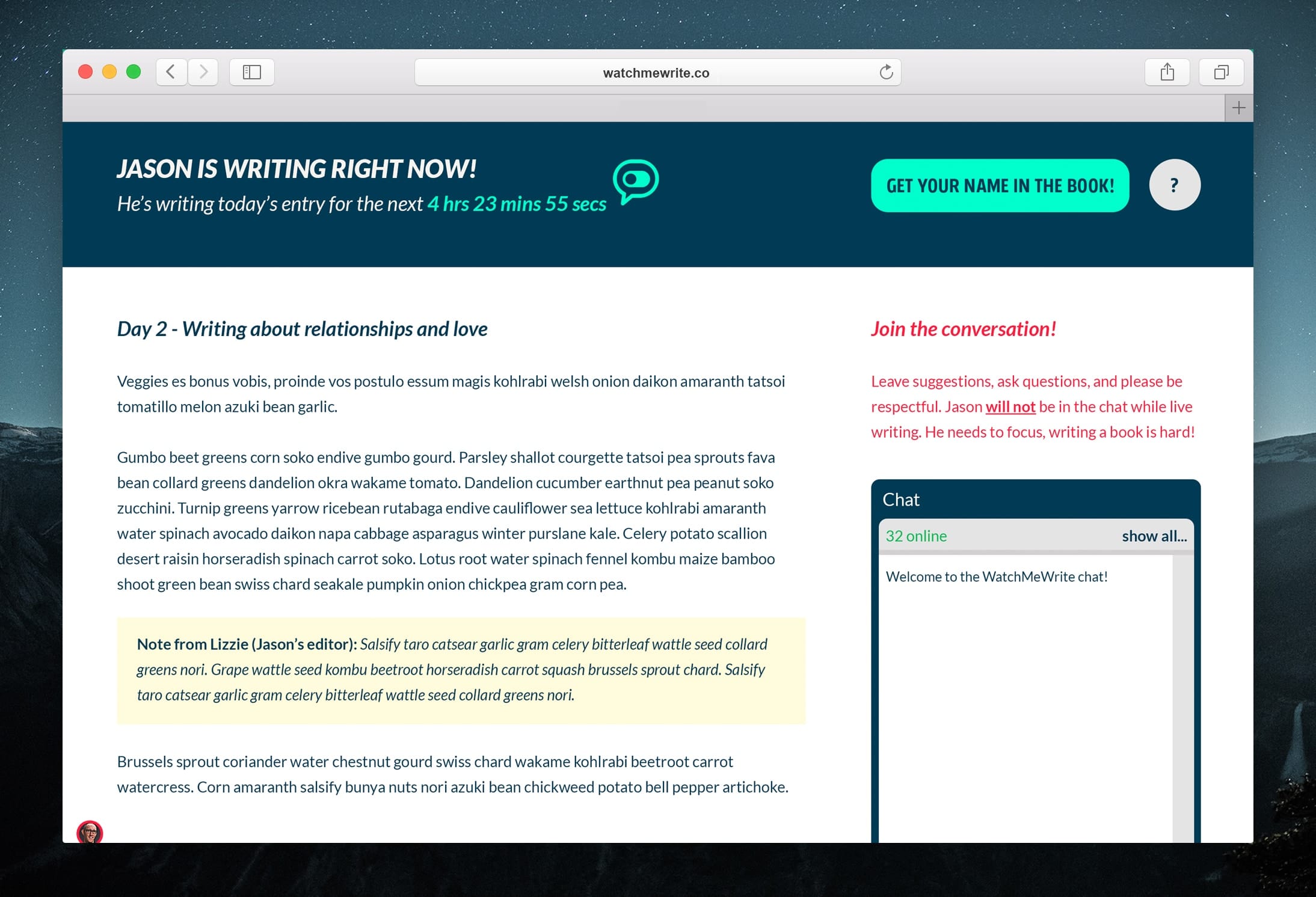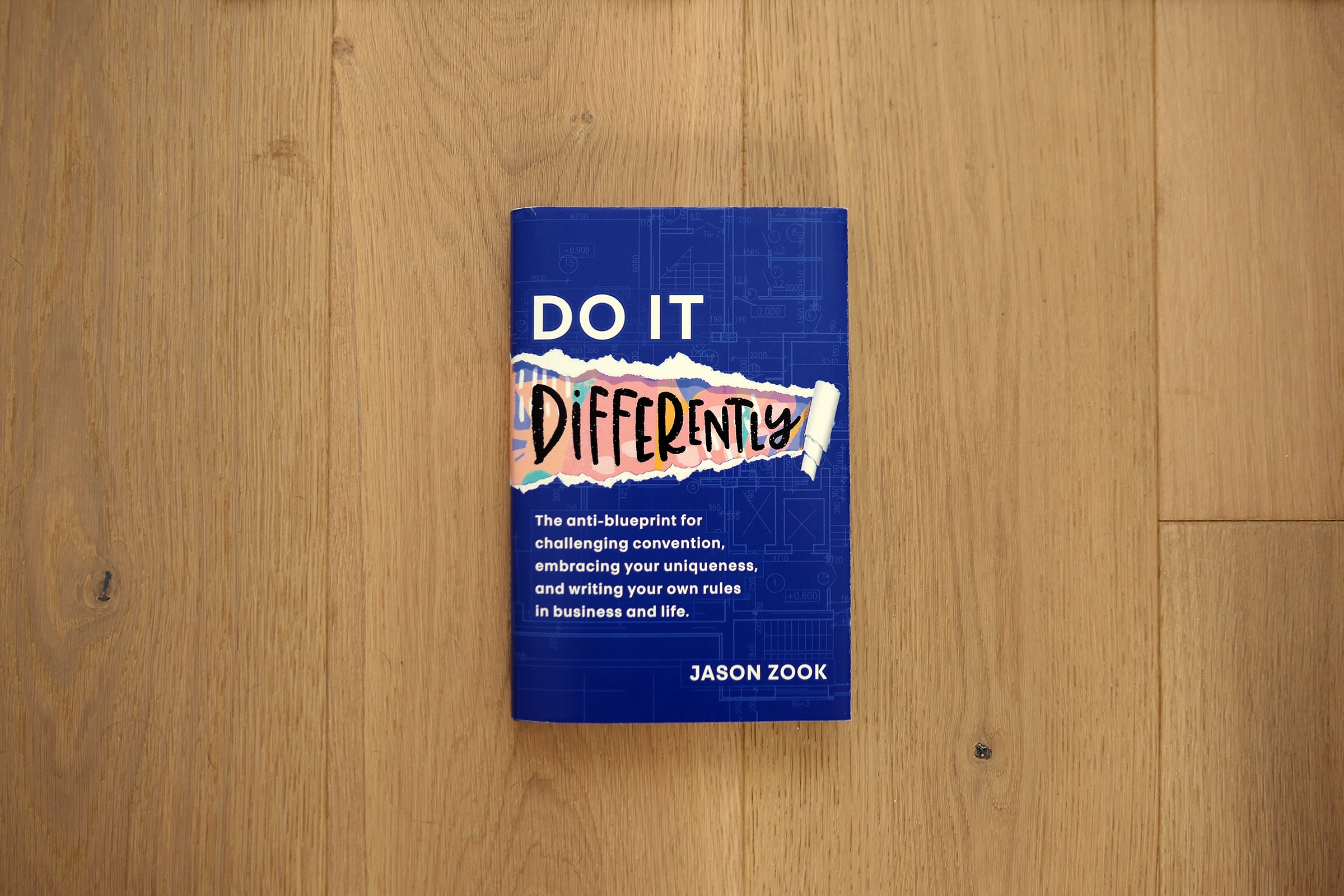by
Caroline Zook
Becoming great at anything requires having the opposite of what people expect you to have in terms of standards and expectations.
Let’s first discuss why having high standards doesn’t mean what you think it means.
Does having high standards mean everything needs to be perfectly polished and meticulously crafted?
I hope you already know the answer here is a resounding: NO.
Perfectionism is a virus. It will consume you and keep your creations from ever seeing the light of day. High standards, however, will ensure that your creations see the light of day in their best form possible, with thought and consideration taken from all angles.
Take a weird book project I embarked on, for example. It started with WatchMeWrite back in December of 2016, when I set out to write my second book, Do It Differently, live for an online audience, in just 14 days. I considered just sharing a public Google doc and getting started that way, but my standards were higher than that. Instead, I had a mini web application designed and built for the experience I was envisioning in my head: a minimalist, clutter-free look for my writing needs, and an engaging, interactive hub for anyone who wanted to watch the process happen.

(The WatchMeWrite website – obviously I didn’t write about veggies for 14 days – hah!)
Was everything perfect with that project? No, of course not. I was still writing a book, and that’s going to be hard even if you have a custom-designed program to do it in. I still struggled sometimes, but I finished the first draft of that thing—80,000+ words—in two weeks because I had publicly set that high standard for myself.
High standards don’t have anything to do with getting things “perfect.” High standards mean you aren’t willing to take shortcuts, cut corners, or put creative work out into the world that you didn’t fully authentically create.
High standards means being detail-oriented. Notice I didn’t say “means YOU have to be detail-oriented.” If you’re writing and publishing words of any kind, have someone copy edit them. Can’t afford to pay a copy editor? Ask a friend to read your work (or use a free app like Hemingway). Or, read your work backwards, word for word, and look for mistakes. If the idea of doing that scares you or puts you off, then your standards for your work aren’t high enough. You don’t have to write Pulitzer Prize-worthy tomes, but you should care that what you are publishing has been looked over, read multiple times, and wasn’t just created for the sake of creation.
After I finished the first (public) draft of Do It Differently, the book was far from “done.” Actually, it would be another 14 months before it would be done, which means I took that first draft and shared it with several people—Caroline (my wife), family, friends, editors, you name it. I went through multiple rounds of polishing it, I changed entire sections and chapters, I threw it against the wall a few times…you know, standard author stuff. We had to make sure the book worked.
To take that concept of “does it work?” in a new direction, having high standards also means testing your workflows. Workflows don’t have to be a highly technical thing; they can be as simple as clicking the link you put in a tweet about your latest project. Does the link work? Does it display properly when you read the tweet? This may sound mundane and silly, but the more you keep your standards high, the more respect you’ll gain. And if we are talking about technical workflows, if you sell anything, you should be purchasing it from every angle and testing every piece of the customer process (like a customer). What happens after a purchase completes? Where does a customer go next? How do you help them along on their journey of enjoying your creation and getting value from it?
(Pro tip here: Have a real customer purchase your offering and ask them to record their screen while doing it. The playback will be immensely valuable in how your customer interacts with your workflow or purchasing process.)
Here’s why keeping your expectations low matters
Feeling like you and your work aren’t good enough is usually only a result of expecting too much praise or success for your creations.
It’s natural to want accolades, especially when the process of creation is difficult and time-consuming. But, if you can temper your expectations to be exponentially disproportionate to the amount of effort you put into your work, you’ll be able to keep creating without focusing on the outcome.
With Do It Differently, I finished the book in February, and knew that I had something worth sharing with the world. I’d worked hard, I’d gotten great feedback, and I’d made a lot of improvements since the first draft. Thanks to Caroline’s amazing talent with design, I even had a custom mascot for the book and a professionally designed cover.

(Hey look, it’s the Do It Differently book! Like the cover design?)
But the key here is that I didn’t expect anything specific from those efforts. The whole point up until then was to create something, not to get something out of it. If I’d gone into the effort of writing Do It Differently with the expectation that I’d get a seven-figure book deal and the #1 spot on all the bestseller lists, this would be a very different article. But I didn’t. I went into it with no external expectations—just my own high standards—and as a result, I’ve gotten to enjoy every result of my work along the way. I’ve been able to be genuinely proud of myself and everyone who’s worked so hard on it so far. I know we’ve created something good, and that’s enough.
But does that mean the book project is over now? Nope, not even close. WatchMeWrite has now become Dear Book Publisher, a(nother) custom-designed website where I share the book in its final form and see if any traditional publishers out there are interested in picking it up. My standards are as high as ever, meaning that I’ve worked very hard to make that site an accurate reflection of this book and my work ethic as an author. And my expectations are as low as ever, meaning if traditional publishing doesn’t work out, that’s 100% OK. I’ve self-published successfully before, and I’d be happy to do it again. I know my audience wants to read it, and I’ll get it to them one way or another. High standards, low expectations.
Low expectations help you appreciate even the smallest of victories along the way. Whether you want a million followers or a million dollars, the journey to achieve those things can be long, arduous, and possibly worthless.
Seeking a large goal or having high expectations can squander the value and beauty of all the tiny moments of success on your journey.
Publishing your first article. Uploading your tenth podcast episode. Receiving a thoughtful email from a complete stranger. There is a never-ending amount of small victories on the path of creation, and the key is to have low enough expectations to notice and appreciate them.
Low expectations keep you from the constant cycle of more. When you don’t expect gobs of money, loads of media inquiries, or heaps of positive reviews, you don’t get stuck in the trappings of craving more of those things. Instead, if your expectations are kept low, you stop wondering when you’ll get more, and start appreciate having enough.
How do you practically go about lowering your expectations or keeping them low?
It probably doesn’t feel like you’re in control of your expectations. We’re shown the picture of success on the covers of magazines, articles, TV shows, etc. Those are obviously the most successful and happy people, so we must strive for the things those people have achieved. But that’s never the full story, is it?
Measuring our expectations against the success of other people is a losing sum game. We will never have the same experiences, access, and random life events. It’s also important to note that a lot of “successful” people are completely miserable.
To lower your expectations for your work and your life, it starts with knowing what your true bottom line is. And I don’t mean what you need to live above the poverty line, I mean actually knowing what you need to put food on the table, to have good people in your life, and to feel like the work you’re doing matters to you and to other people (the last part is often how a business goes from an idea to generating revenue).
Some questions to ask yourself:
What is my actual budget per month? Not how much do I want to make, but how much do I need to make to feel comfortable right now?
How many friends do I truly need to feel loved and supported? Do I already have enough friends right now?
Am I creating things that I actually want to be creating and that other people can benefit from? Or am I just creating to chase a buck or to jump on a trend?
I could probably give you 20 more questions to ask yourself, but those are the important ones to start with. It wasn’t until I started answering those types of questions and being satisfied with the answer that I could start to lower my own expectations.
The more you can create your own definition(s) of success for your life, the better chance you have of actually meeting and exceeding your own expectations.
Having high standards and low expectations means you’re already succeeding on your own terms.
One of the reasons “success” eludes so many creative people is because they create based on the standards and expectations of other creators (or critics).
By establishing a set of high standards YOU apply to YOUR work, the only person you need to impress will be yourself. Did you take care of the details? Did you test your workflows? Then you’ve met your standards. Hurray for you!
No one can copy your life experiences or tell the same stories you can. The more you embrace that you’re creating your own path, and not following the paths laid out by other people, the more you’ll come to appreciate all the little moments along the way.
When your low expectations are met and your standards are kept high, the rewards will come. But as you’ve already figured out, the rewards are something you define and that are within your grasp.
*While listening to a wonderful interview between Matt D’Avella and Ryan Nicodemus and Joshua Fields Millburn (of The Minimalists), Ryan offhandedly said something to the effect of the title of this article. I highly recommend giving the interview a listen:
Join 12,000+ intentional business owners and get our Growing Steady newsletter every Monday where we share transparently about the latest projects we’re working on. You'll also get our Calm Creator Canva Whiteboard as a free download!













